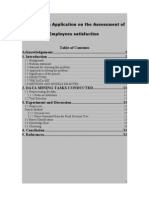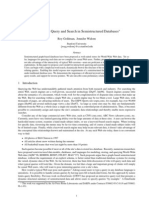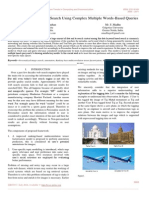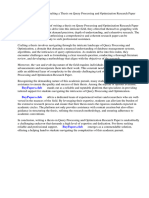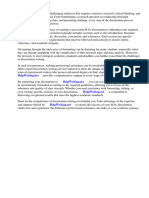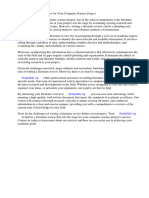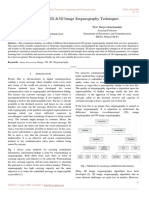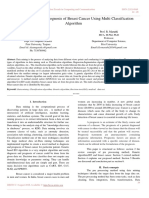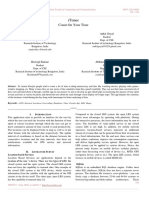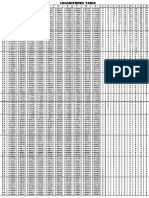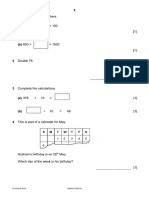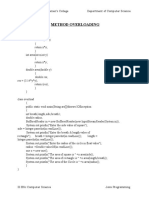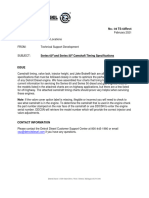Optimized Prediction of Hard Keyword Queries Over Databases
Optimized Prediction of Hard Keyword Queries Over Databases
Uploaded by
Editor IJRITCCCopyright:
Available Formats
Optimized Prediction of Hard Keyword Queries Over Databases
Optimized Prediction of Hard Keyword Queries Over Databases
Uploaded by
Editor IJRITCCCopyright
Available Formats
Share this document
Did you find this document useful?
Is this content inappropriate?
Copyright:
Available Formats
Optimized Prediction of Hard Keyword Queries Over Databases
Optimized Prediction of Hard Keyword Queries Over Databases
Uploaded by
Editor IJRITCCCopyright:
Available Formats
International Journal on Recent and Innovation Trends in Computing and Communication
Volume: 2 Issue: 12
ISSN: 2321-8169
4243 - 4247
_____________________________________________________________________________________________
Optimized Prediction of Hard Keyword Queries Over Databases
Mr. Sameer P Mamadapure
Department of Computer Engineering,
JSPMs JSCOE Pune, India
Email:sam16.mamadapure@gmail.com
Prof P D Lambhate
Department of Computer Engineering
JSPMs JSCOE Pune, India
Email:lambhatepoonam9@gmail.com
Abstract Keyword Query Interface on databases gives easy access to data, but undergo from low ranking quality, i.e., low precision and/or
recall. It would be constructive to recognize queries that are likely to have low ranking quality to improve the user satisfaction. For example, the
system may suggest to the user alternative queries for such difficult queries. Goal of this paper is to predict the characteristics of hard queries
and propose a novel framework to measure the degree of difficulty for a keyword query over a database, allowing for both the structure and the
content of the database and the results of query. There are query difficulty prediction model but results indicate that even with structured data,
finding the desired answers to keyword queries is still a hard task.
Further, we will use linguistic features Such as morphological features, syntactical features, and semantic features for effective prediction of
difficult keyword queries over database. Due to this, Time required for predicting the difficult keywords over large dataset is minimized and
process becomes robust and accurate.
KeywordsQuery performance, query effectiveness, keyword query, robustness,Prediction,Database
__________________________________________________*****_________________________________________________
XML search methods which we implemented return rankings
I. INTRODUCTION
of considerably lower quality than their average ranking
KEYWORD query interfaces (KQIs) for databases paying
quality over all queries. Therefore, some queries are more
much attention in the last decade due to ease of use in
difficult than others. Furthermore, no matter which ranking
searching and exploring the data. [2], [4] keyword queries
method is used, we cannot deliver a reasonable ranking for
characteristically have many possible answers. KQIs must
these queries. It is important for a KQI to recognize such
recognize the information needs behind keyword queries and
queries and warn the user or employ alternative techniques
rank the answers so that the desired answers appear at the top
like query reformulation or query suggestions. It may also use
of the list. Databases contain entity and attributes and values.
techniques such as query results diversification. There has not
Some of the problems of answering a query are likely to have
been any work on predicting or analyzing the difficulties of
users do not specify the preferred schema element(s) for each
queries over databases. Researchers have proposed some
query term. For e.g. keyword Godfather on the movie
methods to detect difficult queries over plain text document
database does not state that user is interested in title or
collections. But, these techniques are not applicable to our
Distributor Company. So, a KQI must find the desired
problem since they ignore the schema of the database. In
attributes associated with each term in the query and users do
particular, as mentioned earlier, a KQI must assign each query
not give enough information about their desired entities. For
term to a schema element(s) in the database In this paper,
example; keyword may return movies or actors or producers.
analyzing the characteristics of difficult queries over databases
Recently, there have been joint efforts are taken for giving
and propose a novel method to detect or identify such queries
standard benchmarks and evaluation platforms for keyword
that are likely to improve user satisfaction.
search methods over databases. One effort is the data-centric
track of INEX Workshop where KQIs are evaluated over the
II. LITERATURE SURVEY
well-known IMDB data set which contains structured
Some Research studies have presented different methods to
information about movies and people. [9] One more effort is
predict hard queries over unstructured documents or plain text
the series of Semantic Search Challenges (Research) at
collection. It can classify into two groups: pre-retrieval and
Semantic Search Workshop, where the data set is the Billion
post-retrieval methods.Pre-retrieval methods predict the
Triple Challenge.[10] It is extracted from Wikipedia. The
difficulty of a query without computing its results. These
queries are used from Yahoo! Keyword query log. Users have
methods usually use the statistical properties of the terms in
provided relevance judgments for both benchmarks. These
the query to measure specificity, ambiguity, or termresults indicate that even with structured data, finding the
relatedness of the query to predict its difficulty. Examples are
preferred answers to keyword queries is still a hard task.
average inverse document frequency of the query terms or the
Ranking quality of the methods used in both workshops,
number of documents that contain at least one query term.
observed that they performing very poorly on a subset of
These methods generally assume that the more discriminative
queries. For example, consider the query ancient Rome era
the query terms are, the easier the query will be. Post retrieval
over the IMDB data set. Users would like to see information
methods make use of the results of a query to forecast its
about movies that talk about ancient Rome. For this query, the
4792
IJRITCC | December 2014, Available @ http://www.ijritcc.org
_______________________________________________________________________________________
International Journal on Recent and Innovation Trends in Computing and Communication
Volume: 2 Issue: 12
ISSN: 2321-8169
4243 - 4247
_____________________________________________________________________________________________
difficulty and generally fall into one of the following
categories.
Clarity-score-based: It is based on the concept of clarity
score assume that users are concerned in a very few topics.
Thus, sufficiently noticeable from other documents in the
collection. It is efficient than pre-retrieval based methods for
text documents. Some systems compute the distinguish ability
of the queries results from the documents in the collection by
comparing the probability distribution of terms in the results
with the probability distribution of terms in the whole
collection. If these probability distributions are relatively
similar, the query results contain information about almost as
many topics as the whole collection, thus, the query is
considered difficult. Several successors propose methods to
improve the efficiency and effectiveness of clarity score.
However, one requires domain knowledge about the data sets
to extend idea of clarity score for queries over databases. Each
topic in a database contains the entities that are about a similar
subject.
Ranking-score-based: The ranking score of a document
returned by the retrieval systems for an input query may
estimate the similarity of the query and the document. Some
recent methods measure the difficulty of a query based on the
score distribution of its results.
Robustness-based: Another group of post-retrieval methods
argue that the results of an easy query are relatively stable
against the perturbation of queries [3], documents [11] or
ranking algorithms. Our proposed query difficulty
Prediction model falls in this category. Some methods use
machine learning techniques to study the properties of difficult
queries and predict their hardness. They have similar
limitations as the other approaches when applied to structured
data. Moreover, their success depends on the amount and
quality of their available training data. Enough and high
quality training data is not available for many databases. Some
researchers propose frameworks that theoretically explain
existing Predictors and combine them to achieve higher
prediction accuracy.
Keyword queries over structured databases are disreputably
ambiguous. No single understanding of a keyword query can
satisfy all users, and multiple interpretations may yield
overlapping results. It proposes a scheme to balance the
relevance and novelty of keyword search results over
structured databases. Firstly, it presents a probabilistic model
which effectively ranks the possible interpretations of a
keyword query over structured data. [12] Forecast query
difficulty based on linguistic features, using TreeTagger and
other natural language processing tools. Topic features include
morphological features (number of words, average of proper
nouns, and average number of numeral values), syntactical
features (average conjunctions and prepositions, average
syntactic depth and link span) or semantic features (average
polysemy value). They found that the only positively
correlated feature is the number of proper nouns.It use some
morphological or syntactic features in our topic prediction
algorithm.[13]
III. LITERATURE REVIEW:
References
Learning to
Estimate Query
Difficulty Including
Applications
to Missing
Content
Detection and
Distributed
Information
Back to the
Roots: A
Probabilistic
Framework for
QueryPerformance
Prediction
A Unified
Framework for
Post-Retrieval
QueryPerformance
Prediction
Techniques
used
Machine
learning
Limitations
Post-retrieval
(Clarity)
depends mainly on the
domain knowledge and
query length, restricted
amount of training data
understanding users
preferences.
Post-retrieval
It outperforms on large
dataset
IV. PROPOSED SYSTEM
A) Problem Definition:
From our study few research studies presented on predicting
or analyzing the difficulties of queries over databases. There
are different methods presented for identifying difficult
queries over plain text document collections recently.
However such methods are not applicable to our problem since
they ignore the structure of the database. There are two
categories of existing methods, pre-retrieval and post-retrieval
for predicting the difficulties of query.
But below are limitations of this method:
1) Pre-retrieval methods are having less prediction accuracies.
2) Post-retrieval methods are having better prediction
accuracies but it requires domain knowledge about the data
4244
IJRITCC | December 2014, Available @ http://www.ijritcc.org
_______________________________________________________________________________________
International Journal on Recent and Innovation Trends in Computing and Communication
Volume: 2 Issue: 12
ISSN: 2321-8169
4243 - 4247
_____________________________________________________________________________________________
Sets to extend idea of clarity score for queries over databases.
3) Each topic in a database contains the entities that are about
a similar subject.
4) Some Post-retrieval methods success only depends on the
amount and quality of their available data.
Above problems were mitigated by recently presented efficient
method for prediction of difficult keywords over databases.
This method efficiently solving the problem of predicting the
effectiveness of keyword queries over DBs as compared to
existing methods with highest level of accuracy. This method
takes less time and having relatively low errors for predicting
difficulty of queries. This method suffered from limitations
like not evaluated with large datasets.
As well as string approximation is not taken under
considerations.
B) Proposed Method:
In this paper our main aim is to present new improve method
for difficult keyword prediction by overcoming the limitations
of Scalability, dataset flexibility, and string approximation. As
well .Due to this, Time required for predicting the difficult
keywords over large dataset is minimized and process
becomes robust and accurate. In addition to this, spatial
approximate string query is presented. We are going to use
edit distance as the similarity Measurement for the string
predicate and focus on the range queries as the spatial
predicate. We will be use linguistic features Such as
morphological features, syntactical features, semantic features
for effective prediction of difficult keyword queries over
database.
It ranges between 1 and 1, where 1, 1, and 0 indicate perfect
positive correlation, perfect negative correlation, and almost
no correlation, respectively.
SR (Q, g, DB, XDB)
= E {Sim (L (Q, g, DB), L (Q, g, XDB))}
=
Where , M (|A| V) and Sim denotes the Spearman rank
correlation between the ranked answer lists.
Noise Generation in Databases:-
we have:
f
( )=
and
f
( )=
where
depicts the number of times
appears in a
noisy version of attribute value Ai and f
( ) computes the
probability of term
to appear in
times.
The noise generation models attribute value
whose
attribute is and entity set is
C) Mathematical Model:
Structured Robustness:Let V be the number of distinct terms in database DB. Each
attribute value Aa A, 1 a |A|, can be modeled using a Vdimensional multivariate distribution = ( ,1, . . . , ,V),
where
,j
is a random variable that represents the
frequency of term wj in Aa. The probability mass function of
Xa is:
FXa (
) = Pr(
,1 =
where = xa,1, . . . ,
integers.
f
= Pr(
where
,1, . . . ,
,V and
( )=f
,...,
,j ,
,...,
=
,V =
,V),
are non-negative
)
where 0 , ,
1 and
+
+
= 1. f
, f ,
and f
model the noise in attribute value, attribute, and entity
set levels, respectively. Parameters A, T and S have the
same values for all terms w QV and are set empirically.
Since each attribute value
is a small document, we
model f
as a Poisson distribution:
f
Similarly, we model each attribute , 1 t |T |, as a bag of
words and use Poisson distribution to model the noise
generation in the attribute level:
),
are vectors of size V that contain non-negative
integers. The domain of is all |A| V matrices that contain
non-negative integers, i.e. M (|A| V).
Using similar assumptions, we model the changes in the
frequencies of the terms in entity set , 1 s |S|, using
Poisson distribution:
Structured Robustness calculation:4245
IJRITCC | December 2014, Available @ http://www.ijritcc.org
_______________________________________________________________________________________
International Journal on Recent and Innovation Trends in Computing and Communication
Volume: 2 Issue: 12
ISSN: 2321-8169
4243 - 4247
_____________________________________________________________________________________________
f
D) Implementation Methodology:
Proposed algorithm:
IV .Experimental Analysis and Result:
Data Set of movie database is used for implementation. Data
set is gathered through
(http://www.inex.otago.ac.nz/tracks/strong/strong.asp)
I) Efficient Computation of SR Score
Structured Robustness Algorithm:
Which computes the exact SR score based on the top K result
entities.
Input Query Q, Top-K result list L of Q by ranking function g,
Metadata M, Inverted indexes I, Number of corruption
iteration N.
Comparison Graph
1: SR
0; C {}
2: FOR i =1
N DO
3: I I; M M; L L;
4: FOR each result R in L DO
5: FOR each attribute value A in R DO
6: A
A
7: FOR each keywords w in Q DO
8: Compute of w in A
9: IF of w varies in Aand A THEN
10: update A; M and entry of w in I;
11: Add A to R;
12: Add R to L;
13: Rank L using g, which returns L, based onI; M;
14: SR+ = Sim (L; L);
15: RETURN Sr
SR N;
II) Approximation Algorithms:
Approximation algorithms is used to improve the efficiency of
SR Algorithm
a) Query-specific Attribute values Only Approximation
(QAO-Approx):
Corrupts only the attribute values that match at least one
query term.
b) Static Global Stats Approximation (SGS-Approx)
Corrupt only the top-K result entities
III) Ranking Algorithm: PRMS (Probabilistic Retrieval Model
for Semi structured Data)
Incorporating mapping probabilities, improves retrieval
effectiveness significantly over Semi structured Data
IV) We will compute correlation scores between linguistic
features and the average recall and precision scores for the
difficult keyword queries. Correlation is a simple statistical
measure, ranging from +1 to -1.
Query generation Time in miliseconds
IV .CONCLUSION
In this paper, It introduces the novel problem of predicting the
effectiveness of keyword queries over databases. It shows that
the current prediction methods for queries over unstructured
data sources cannot be effectively used to solve this problem.
It present new improve method for difficult keyword
prediction by overcoming the limitations of Scalability, dataset
flexibility, and string approximation. This New approach is
nothing but extended framework in which we are going apply
linguistic features by this query complexity can be analyze. As
well it will measure the degree of the difficulty of a keyword
query over a database, using the ranking robustness principle.
The algorithms predict the difficulty of a query with relatively
low errors and negligible time overheads.
References
[1]
Shiwen Cheng, Arash Termehchy, and Vagelis Hristidis
Efficient Prediction of Difficult Keyword Queries over
Databases, IEEE TRANSACTIONS ON KNOWLEDGE
AND DATA ENGINEERING, VOL. 26, NO. 6, JUNE
2014
4246
IJRITCC | December 2014, Available @ http://www.ijritcc.org
_______________________________________________________________________________________
International Journal on Recent and Innovation Trends in Computing and Communication
Volume: 2 Issue: 12
ISSN: 2321-8169
4243 - 4247
_____________________________________________________________________________________________
[2]
[3]
[4]
[5]
[6]
[7]
[8]
[9]
[10]
[11]
[12]
[13]
Hristidis, L. Gravano, and Y. Papakonstantinou.Efficient
IR style keyword search over relational databases, in Proc.
29th VLDB Conf., Berlin, Germany, 2003, pp. 850861.
E. Yom-Tov, S. Fine, D. Carmel, and A. Darlow,Learning
to estimate query difficulty:Including applications to
missing content detection and distributed information
retrieval, in Proc.28th Annu. Int. ACM SIGIR Conf.
Research Development Information Retrieval, Salvador,
Brazil, 2005, pp. 512519.
O. Kurland, A. Shtok, S. Hummel, F. Raiber, D. Carmel,
and O. Rom,Back to the roots: A probabilistic framework
for query performance prediction,, in Proc. 21 st Int.
CIKM, Maui, HI, USA,2012, pp. 823832..
O. Kurland, A. Shtok, D. Carmel, and S. Hummel,A
Unified framework for postretrieval query-performance
prediction,in Proc. 3rd Int. ICTIR, Bertinoro, Italy,2011,
pp. 1526.
S. C. Townsend, Y. Zhou, and B. Croft,Predicting query
performance,in Proc.SIGIR 02, Tampere, Finland, pp.
299306.
J. Han, M. Kamber, and J. Pei,Data Mining: Concepts and
Techniques,San Francisco,CA: Morgan Kaufmann, 2011.
S. Cheng, A. Termehchy, and V. Hristidis,Predicting the
effectiveness of keyword queries on databases,in Proc.
21st ACM Int. CIKM, Maui, HI, 2012, pp. 1213-1222.
Overview of the INEX 2011 Data-Centric Track Qiuyue
Wang1,2, Georgina Ramrez3, Maarten Marx4, Martin
Theobald5, Jaap Kamps6
T. Tran, P. Mika, H. Wang, and M. Grobelnik, Semsearch
S10,in Proc. 3rd Int. WWW Conf., Raleigh, NC, USA,
2010
Y. Zhou and B. Croft, Ranking robustness: A novel
framework to predict query performance, in Proc. 15th
ACM Int. CIKM, Geneva, Switzerland, 2006, pp. 567574.
E. Demidova, P. Fankhauser, X. Zhou, and W. Nejdl,
DivQ: Diversification for keyword search over structured
databases, in Proc. SIGIR 10, Geneva, Switzerland, pp.
331338
Josiane Mothe , Ludovic Tanguy Linguistic features to
predict query difficulty - a case study on previous TREC
campaigns
4247
IJRITCC | December 2014, Available @ http://www.ijritcc.org
_______________________________________________________________________________________
You might also like
- (Xinfeng Zhou) A Practical Guide To Quantitative OrgDocument96 pages(Xinfeng Zhou) A Practical Guide To Quantitative OrgDmitrii Kondratovich100% (3)
- Sample Data Mining Project PaperDocument32 pagesSample Data Mining Project PaperAdisu Wagaw100% (1)
- Assignment 2Document6 pagesAssignment 2Vardhini AluruNo ratings yet
- Recommendation Item Based On Keyword Search Using Big Data: Jafar Sadik Kamadod Prof. Shrivatsa KoulgiDocument3 pagesRecommendation Item Based On Keyword Search Using Big Data: Jafar Sadik Kamadod Prof. Shrivatsa KoulgiEditor IJRITCCNo ratings yet
- Thesis Chapter 3 Sample PhilippinesDocument8 pagesThesis Chapter 3 Sample Philippinesaparnaharrisonstamford100% (1)
- Providing Query Suggestions and Ranking For User Search HistoryDocument5 pagesProviding Query Suggestions and Ranking For User Search HistoryRahul SharmaNo ratings yet
- A Novel Hybrid Classification Model For The Loan Repayment Capability Prediction SystemDocument6 pagesA Novel Hybrid Classification Model For The Loan Repayment Capability Prediction SystemRahul SharmaNo ratings yet
- A Simple Model For Classifying Web Queries by User IntentDocument6 pagesA Simple Model For Classifying Web Queries by User IntentAdrian D.No ratings yet
- Ranking MetricsDocument15 pagesRanking MetricsrobertsharklasersNo ratings yet
- Personalized Web Page Recommendation Using OntologyDocument6 pagesPersonalized Web Page Recommendation Using OntologyEditor IJRITCCNo ratings yet
- NLP Review 3 Formatted 2Document27 pagesNLP Review 3 Formatted 2kimjihaeunNo ratings yet
- An Approach For Design Search Engine Architecture For Document SummarizationDocument6 pagesAn Approach For Design Search Engine Architecture For Document SummarizationEditor IJRITCCNo ratings yet
- FINAL Document KalyaniDocument80 pagesFINAL Document KalyaniDNR PROJECTSNo ratings yet
- I Ji Scs 02222013Document5 pagesI Ji Scs 02222013warse1No ratings yet
- Literature Review of Software TestingDocument6 pagesLiterature Review of Software Testingafmzksqjomfyej100% (1)
- Interactive Query and Search in Semistructured Databases: Roy Goldman, Jennifer WidomDocument7 pagesInteractive Query and Search in Semistructured Databases: Roy Goldman, Jennifer WidompostscriptNo ratings yet
- Personalized Image Search Using Complex Multiple Words-Based QueriesDocument6 pagesPersonalized Image Search Using Complex Multiple Words-Based QueriesmayurNo ratings yet
- Conference Paper LATENT DIRICHLET ALLOCATION (LDA)Document9 pagesConference Paper LATENT DIRICHLET ALLOCATION (LDA)mahi mNo ratings yet
- Literature Review Computer Science ProjectsDocument4 pagesLiterature Review Computer Science Projectsc5jxjm5m100% (1)
- Entropy 22 01057 PDFDocument20 pagesEntropy 22 01057 PDFERENo ratings yet
- The Effects of Data Quality On Machine Learning AlDocument15 pagesThe Effects of Data Quality On Machine Learning AlRishav DugarNo ratings yet
- Java Datamining IEEE Projects 2012 at Seabirds (Chennai, Trichy, Pudukkottai, Thanjavur, Perambalur, Karur)Document9 pagesJava Datamining IEEE Projects 2012 at Seabirds (Chennai, Trichy, Pudukkottai, Thanjavur, Perambalur, Karur)sathish20059No ratings yet
- Keyword Search Over Relational Databases: A Metadata ApproachDocument12 pagesKeyword Search Over Relational Databases: A Metadata ApproachHọc DốtNo ratings yet
- Ieee 2012 Projects Software Engineering at Seabirds (Cochin, Thiruvananthapuram, Mysore, Mangalore, Hubli, Chennai, Trichy)Document7 pagesIeee 2012 Projects Software Engineering at Seabirds (Cochin, Thiruvananthapuram, Mysore, Mangalore, Hubli, Chennai, Trichy)sathish20059No ratings yet
- Movie XgboostDocument7 pagesMovie XgboostHarun ul Rasheed ShaikNo ratings yet
- Query Extraction Using Filtering Technique Over The Stored Data in The DatabaseDocument5 pagesQuery Extraction Using Filtering Technique Over The Stored Data in The DatabaseRahul SharmaNo ratings yet
- Query Recommendations For Interactive Database ExplorationDocument17 pagesQuery Recommendations For Interactive Database ExplorationlocexpNo ratings yet
- PREPROCESSINGOFDresses Sales DATASETDocument20 pagesPREPROCESSINGOFDresses Sales DATASETMusa E. NdlelaNo ratings yet
- Ranking and Searching of Document With New Innovative Method in Text Mining: First ReviewDocument7 pagesRanking and Searching of Document With New Innovative Method in Text Mining: First ReviewInternational Journal of Application or Innovation in Engineering & ManagementNo ratings yet
- Review Paper On Opinion Extraction of Drug Reviews Using PAMMDocument3 pagesReview Paper On Opinion Extraction of Drug Reviews Using PAMMEditor IJRITCCNo ratings yet
- Result Mining For Performance EnhancementDocument1 pageResult Mining For Performance EnhancementmsodhaniNo ratings yet
- Query Similarities in Various Web DatabasesDocument6 pagesQuery Similarities in Various Web DatabasesseventhsensegroupNo ratings yet
- Mining Words and Targets Using Alignment ModelDocument5 pagesMining Words and Targets Using Alignment ModelIJSTENo ratings yet
- Semantic Search Log For Social Personalized SearchDocument6 pagesSemantic Search Log For Social Personalized SearchseventhsensegroupNo ratings yet
- A Comprehensive Recommender System Model Improving Accuracy For Both Warm and Cold Start UsersDocument11 pagesA Comprehensive Recommender System Model Improving Accuracy For Both Warm and Cold Start UsersRAJKUMAR KURAMINo ratings yet
- Research Paper On RdbmsDocument7 pagesResearch Paper On Rdbmsrfxlaerif100% (1)
- Comp Sci - IJCSE - A Hybrid Recommender - AkshitaDocument8 pagesComp Sci - IJCSE - A Hybrid Recommender - Akshitaiaset123No ratings yet
- 1 s2.0 S0925231221017410 MainDocument15 pages1 s2.0 S0925231221017410 MainAbdelkarim GhanemNo ratings yet
- Query Processing and Optimization Research PaperDocument4 pagesQuery Processing and Optimization Research Paperm0d1p1fuwub2No ratings yet
- Research Paper Query ProcessingDocument4 pagesResearch Paper Query Processingfvf442bf100% (1)
- Ijcet: International Journal of Computer Engineering & Technology (Ijcet)Document11 pagesIjcet: International Journal of Computer Engineering & Technology (Ijcet)IAEME PublicationNo ratings yet
- Machine Learning Research Papers PDFDocument7 pagesMachine Learning Research Papers PDFafeascdcz100% (1)
- Ali ReserchDocument23 pagesAli Reserchaslamaneeza8No ratings yet
- M.SC Dissertation FormatDocument5 pagesM.SC Dissertation FormatWriteMySociologyPaperAlbuquerque100% (1)
- A Survey On Different Review Mining TechniquesDocument4 pagesA Survey On Different Review Mining TechniquesInternational Journal of Latest Research in Engineering and TechnologyNo ratings yet
- Samra ResrchDocument20 pagesSamra Resrchaslamaneeza8No ratings yet
- Research Paper On Advanced Database Management SystemDocument5 pagesResearch Paper On Advanced Database Management SystemklbndecndNo ratings yet
- Vocabulary Mismatch Avoidance Techniques: AbstractDocument10 pagesVocabulary Mismatch Avoidance Techniques: AbstractsivakumarNo ratings yet
- Data WarehousingDocument9 pagesData Warehousingprajendangol09No ratings yet
- How To Write Data Analysis For ThesisDocument5 pagesHow To Write Data Analysis For Thesislisajonesshreveport100% (2)
- Sahu, Dwivedi - 2019 - User Profile As A Bridge in Cross-Domain Recommender Systems For Sparsity ReductionDocument21 pagesSahu, Dwivedi - 2019 - User Profile As A Bridge in Cross-Domain Recommender Systems For Sparsity ReductionsahuashishcsNo ratings yet
- Main Steps For Doing Data Mining Project Using Weka: February 2016Document20 pagesMain Steps For Doing Data Mining Project Using Weka: February 2016kavi testNo ratings yet
- Data Mining in Software Engineering: M. Halkidi, D. Spinellis, G. Tsatsaronis and M. VazirgiannisDocument29 pagesData Mining in Software Engineering: M. Halkidi, D. Spinellis, G. Tsatsaronis and M. VazirgiannisManifa HarramNo ratings yet
- Personalization GuideDocument87 pagesPersonalization Guiderevanth191794No ratings yet
- Computer Science Project Literature ReviewDocument6 pagesComputer Science Project Literature Reviewaflsbegdo100% (1)
- Name: Pankaj L. Chowkekar Application ID: 6808 Class: S.Y. M.C.A. (Sem 4) Subject: Advanced Database Techniques Group: ADocument41 pagesName: Pankaj L. Chowkekar Application ID: 6808 Class: S.Y. M.C.A. (Sem 4) Subject: Advanced Database Techniques Group: ABhavin PanchalNo ratings yet
- VideDocument80 pagesVideRajnishKumarNo ratings yet
- 127 1498038923 - 21-06-2017 PDFDocument9 pages127 1498038923 - 21-06-2017 PDFEditor IJRITCCNo ratings yet
- Advanced Analytics with Transact-SQL: Exploring Hidden Patterns and Rules in Your DataFrom EverandAdvanced Analytics with Transact-SQL: Exploring Hidden Patterns and Rules in Your DataNo ratings yet
- Automatic Image Annotation: Enhancing Visual Understanding through Automated TaggingFrom EverandAutomatic Image Annotation: Enhancing Visual Understanding through Automated TaggingNo ratings yet
- A Review of Wearable Antenna For Body Area Network ApplicationDocument4 pagesA Review of Wearable Antenna For Body Area Network ApplicationEditor IJRITCCNo ratings yet
- A Review of 2D &3D Image Steganography TechniquesDocument5 pagesA Review of 2D &3D Image Steganography TechniquesEditor IJRITCCNo ratings yet
- Channel Estimation Techniques Over MIMO-OFDM SystemDocument4 pagesChannel Estimation Techniques Over MIMO-OFDM SystemEditor IJRITCCNo ratings yet
- Importance of Similarity Measures in Effective Web Information RetrievalDocument5 pagesImportance of Similarity Measures in Effective Web Information RetrievalEditor IJRITCCNo ratings yet
- A Review of 2D &3D Image Steganography TechniquesDocument5 pagesA Review of 2D &3D Image Steganography TechniquesEditor IJRITCCNo ratings yet
- Prediction of Crop Yield Using LS-SVMDocument3 pagesPrediction of Crop Yield Using LS-SVMEditor IJRITCCNo ratings yet
- A Study of Focused Web Crawling TechniquesDocument4 pagesA Study of Focused Web Crawling TechniquesEditor IJRITCCNo ratings yet
- Predictive Analysis For Diabetes Using Tableau: Dhanamma Jagli Siddhanth KotianDocument3 pagesPredictive Analysis For Diabetes Using Tableau: Dhanamma Jagli Siddhanth Kotianrahul sharmaNo ratings yet
- Diagnosis and Prognosis of Breast Cancer Using Multi Classification AlgorithmDocument5 pagesDiagnosis and Prognosis of Breast Cancer Using Multi Classification AlgorithmEditor IJRITCCNo ratings yet
- Hybrid Algorithm For Enhanced Watermark Security With Robust DetectionDocument5 pagesHybrid Algorithm For Enhanced Watermark Security With Robust Detectionrahul sharmaNo ratings yet
- 45 1530697786 - 04-07-2018 PDFDocument5 pages45 1530697786 - 04-07-2018 PDFrahul sharmaNo ratings yet
- Safeguarding Data Privacy by Placing Multi-Level Access RestrictionsDocument3 pagesSafeguarding Data Privacy by Placing Multi-Level Access Restrictionsrahul sharmaNo ratings yet
- Itimer: Count On Your TimeDocument4 pagesItimer: Count On Your Timerahul sharmaNo ratings yet
- 44 1530697679 - 04-07-2018 PDFDocument3 pages44 1530697679 - 04-07-2018 PDFrahul sharmaNo ratings yet
- 49 1530872658 - 06-07-2018 PDFDocument6 pages49 1530872658 - 06-07-2018 PDFrahul sharmaNo ratings yet
- 41 1530347319 - 30-06-2018 PDFDocument9 pages41 1530347319 - 30-06-2018 PDFrahul sharmaNo ratings yet
- Paper On Design and Analysis of Wheel Set Assembly & Disassembly Hydraulic Press MachineDocument4 pagesPaper On Design and Analysis of Wheel Set Assembly & Disassembly Hydraulic Press MachineEditor IJRITCCNo ratings yet
- ISTQB-Foundation-Agile-Syllabus - Chapter 3Document30 pagesISTQB-Foundation-Agile-Syllabus - Chapter 3Mostafa AbdelmageedNo ratings yet
- Differential Geometry of Curves and Surfaces 3. Regular SurfacesDocument16 pagesDifferential Geometry of Curves and Surfaces 3. Regular SurfacesyrodroNo ratings yet
- Using The LCD5501Z Keypad: Viewing Open Zones Viewing Zones in AlarmDocument2 pagesUsing The LCD5501Z Keypad: Viewing Open Zones Viewing Zones in AlarmVictor BecerraNo ratings yet
- Log AntilogDocument2 pagesLog AntilogParthaEducationalInstitutions100% (2)
- Act UtilitarianismDocument2 pagesAct UtilitarianismMarycorNo ratings yet
- Modulation of LightDocument48 pagesModulation of LightPouyan NasrNo ratings yet
- Basics and Eq CKT of Induction MotorDocument16 pagesBasics and Eq CKT of Induction MotorAshwini SinghNo ratings yet
- Flashcards For Neet Chemistry Dec13 SolutionsDocument5 pagesFlashcards For Neet Chemistry Dec13 Solutionsshriyanshu33No ratings yet
- Tractor Design and Assembly: Using SolidworksDocument28 pagesTractor Design and Assembly: Using SolidworksJay RaghavNo ratings yet
- Effect of Tooth Substrate and Porcelain Thickness On Porcelain - Veneer Failure Loads in Vitro PDFDocument7 pagesEffect of Tooth Substrate and Porcelain Thickness On Porcelain - Veneer Failure Loads in Vitro PDFSgNo ratings yet
- Lennox DLSC Heat Pump Product Brochure-1Document2 pagesLennox DLSC Heat Pump Product Brochure-1dgpetrov1977No ratings yet
- Capacitor Phet LabDocument2 pagesCapacitor Phet Labapi-317403302No ratings yet
- CV 14S16052 - Pascal SitanggangDocument2 pagesCV 14S16052 - Pascal SitanggangPelindung van ScNo ratings yet
- The G4Zu.... Spider Beam...... SkypperDocument1 pageThe G4Zu.... Spider Beam...... SkypperMarckos FrancoNo ratings yet
- Introduction To Electronics, Familiarization With Basic Electronic Components and Measuring Instruments.Document46 pagesIntroduction To Electronics, Familiarization With Basic Electronic Components and Measuring Instruments.Aditya MittalNo ratings yet
- DS Unit 1Document96 pagesDS Unit 1BADMANNo ratings yet
- Python Workshop ExercisesDocument7 pagesPython Workshop ExercisesMegaVNo ratings yet
- Service Manual: Mini Hi-Fi Component SystemDocument89 pagesService Manual: Mini Hi-Fi Component SystemCesar EspinelNo ratings yet
- CambrDocument14 pagesCambrAhmed MasoudNo ratings yet
- M54HC259 M74HC259: 8 Bit Addressable LatchDocument12 pagesM54HC259 M74HC259: 8 Bit Addressable LatchnooorNo ratings yet
- MP6001 r1.0Document13 pagesMP6001 r1.0nan keNo ratings yet
- PDS Lab - Section 9: Lab Test 1 - Even PC February 10th, 2020Document2 pagesPDS Lab - Section 9: Lab Test 1 - Even PC February 10th, 2020StrangerNo ratings yet
- Sony - KF-E42A10-KF-E50A10 PantallaDocument143 pagesSony - KF-E42A10-KF-E50A10 PantallaFermin MoncadaNo ratings yet
- Calorimetry ThermodynamicsDocument15 pagesCalorimetry Thermodynamicssanits591No ratings yet
- Possible Ways To Unlock Idea Netsetter Huawei E1732?Document16 pagesPossible Ways To Unlock Idea Netsetter Huawei E1732?Pawan VishwakarmaNo ratings yet
- Exportar PDF BridgeDocument2 pagesExportar PDF BridgeRussellNo ratings yet
- Java Lab ManualDocument32 pagesJava Lab ManualRAJESHNo ratings yet
- Module 3 Program Development Tools in The tms320f28335 1 PDFDocument47 pagesModule 3 Program Development Tools in The tms320f28335 1 PDFMORARI KINKAR SAMEER KUMARNo ratings yet
- MC 10187830 0001Document10 pagesMC 10187830 0001Lee SchultzNo ratings yet

